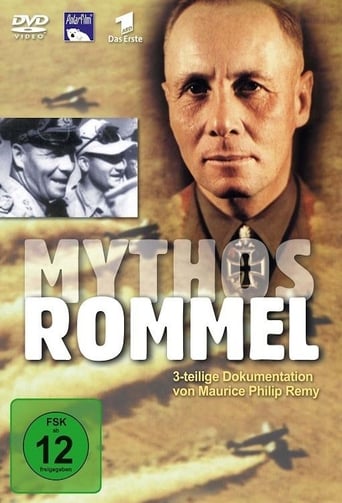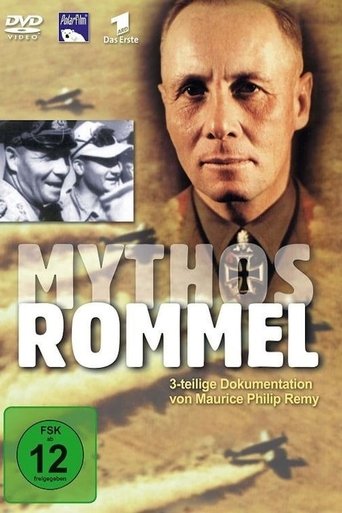The Rommel Myth Season 1

In 2002, Munich born Maurice Philip Remy produced a three-part documentary film, Mythos Rommel ('The Rommel Myth'), for German TV with a book of the same name, chipping away at the Rommel legend dramatically. In the manner of Jeremy Isaacs' award-winning World at War series of 1973, Remy's exhaustive 'Mythos Rommel', later released with with an english-language soundtrack, relies on much pre-war and wartime newsreel footage of Rommel, skillfully weaving in interviews with surviving members of the Field Marshal's staff including Heinz Werner Schmidt; his nurse in North Africa; soldiers who fought for and against him, including Field Marshal Lord Carver; one of Churchill's former secretaries; the unrelated but intriguingly named Italian soldier Mario Rommel and both his grandson and granddaughter Helen and Joseph Pan, and Erwin's son Manfred also are making important contributions. Field Marshall Erwin Rommel was the most famous and celebrated German military commander of the Second World War. He was revered by the Germans, respected by the Allies and nicknamed 'The Desert Fox' for his tactics in the Western Desert - and yet he would die in secret disgrace. Rommel is the most detailed film biography of the German commander ever made. It follows his military career through the Great War to his daring tank assaults during the Blitzkreig of 1940, which brought him to the attention of the Nazi leaders. Goebbels thought him an ideal subject for propaganda, and the German public thrilled to his initial victories in North Africa with the Afrika Korps. However, as the war dragged on, Rommel became ever more tired and disillusioned. The darling of the German newsreels realised that the Nazis could not win the war. Discovering the horrors of the Holocaust, he called his senior command 'tragically filthy'...and started to realise that something had to be done about Adolf Hitler. The story of this fascinating, complex and tormented man is told through original wartime archive film, newsreels and exclusive interviews. Members of his own wartime staff, his son, his driver and veterans from the Afrika Korps and the 8th Army all offer revealing insights into the 'Desert Fox' - and provide a vivid portrait of a man torn between his military values and loyalties and the Nazi regime he served.
Watch NowWith 30 Day Free Trial!
The Rommel Myth
2002
In 2002, Munich born Maurice Philip Remy produced a three-part documentary film, Mythos Rommel ('The Rommel Myth'), for German TV with a book of the same name, chipping away at the Rommel legend dramatically. In the manner of Jeremy Isaacs' award-winning World at War series of 1973, Remy's exhaustive 'Mythos Rommel', later released with with an english-language soundtrack, relies on much pre-war and wartime newsreel footage of Rommel, skillfully weaving in interviews with surviving members of the Field Marshal's staff including Heinz Werner Schmidt; his nurse in North Africa; soldiers who fought for and against him, including Field Marshal Lord Carver; one of Churchill's former secretaries; the unrelated but intriguingly named Italian soldier Mario Rommel and both his grandson and granddaughter Helen and Joseph Pan, and Erwin's son Manfred also are making important contributions. Field Marshall Erwin Rommel was the most famous and celebrated German military commander of the Second World War. He was revered by the Germans, respected by the Allies and nicknamed 'The Desert Fox' for his tactics in the Western Desert - and yet he would die in secret disgrace. Rommel is the most detailed film biography of the German commander ever made. It follows his military career through the Great War to his daring tank assaults during the Blitzkreig of 1940, which brought him to the attention of the Nazi leaders. Goebbels thought him an ideal subject for propaganda, and the German public thrilled to his initial victories in North Africa with the Afrika Korps. However, as the war dragged on, Rommel became ever more tired and disillusioned. The darling of the German newsreels realised that the Nazis could not win the war. Discovering the horrors of the Holocaust, he called his senior command 'tragically filthy'...and started to realise that something had to be done about Adolf Hitler. The story of this fascinating, complex and tormented man is told through original wartime archive film, newsreels and exclusive interviews. Members of his own wartime staff, his son, his driver and veterans from the Afrika Korps and the 8th Army all offer revealing insights into the 'Desert Fox' - and provide a vivid portrait of a man torn between his military values and loyalties and the Nazi regime he served.
Watch Trailer
With 30 Day Free Trial!
The Rommel Myth Season 1 Full Episode Guide
The mystery of whether Rommel knew about the conspiracy to kill Hitler in 1944, and the circumstances surrounding his own suicide. On the 18th of October 1944, the funeral of Field Marshall Erwin Rommel took place in Ulm, near Stuttgart. Hitler made it into a state occasion: Rommel's death was staged for propaganda. In fact Hitler had had Rommel murdered - for high treason. The conclusion recalls Rommel's conspiracy to have Hitler removed from power. Also: the Field Marshal's suicide in 1944.
He has long ranked as a hero throughout the world: Erwin Rommel, also known as the "Desert Fox". In Berlin on the 2nd of October 1942 Rommel was presented with the Field Marshal's baton by Hitler. Rommel appeared to be a loyal follower of the regime - but appearances were deceptive. He no longer believed victory was possible in North Africa, and would soon come to doubt Hitler himself. Part 2 follows Rommel's drive to push back British troops in North Africa in 1942 and his subsequent return to Germany, due to bad health. Investigation into the Desert Fox's reputation as a strategist, asking whether he began making serious tactical errors as British reinforcements in Egypt threatened his country's military supremacy.
On the 15th of February 1941, a German fighting unit arrived in Tripoli, Libya. Their commander was about to become famous. Soon millions were familiar with these early pictures from the North African theatre of war. General Rommel, commander in chief of the German fighting troops in Africa, with his men at the front. Goebbels wanted to make him into a folk hero, but he wasn't easy to get close to. Part 1 of three examines Rommel's childhood, his early career and his gifts as a military tactician in World Wars I and II. What determined the defeat of the Afrikakorps at El Alamein? Was it Rommel's own strategic error, his opponent Montgomery or the successful deciphering of the Enigma coding machine?
Free Trial Channels
Seasons


























